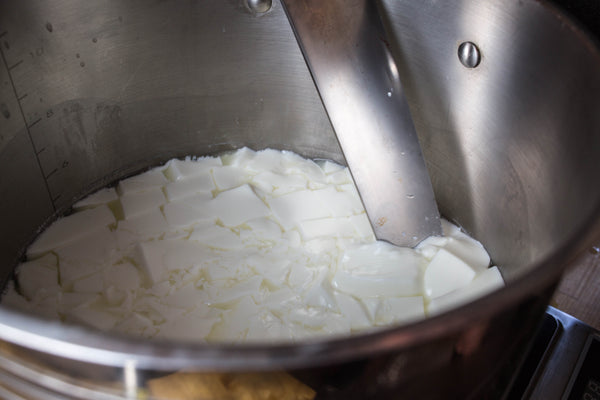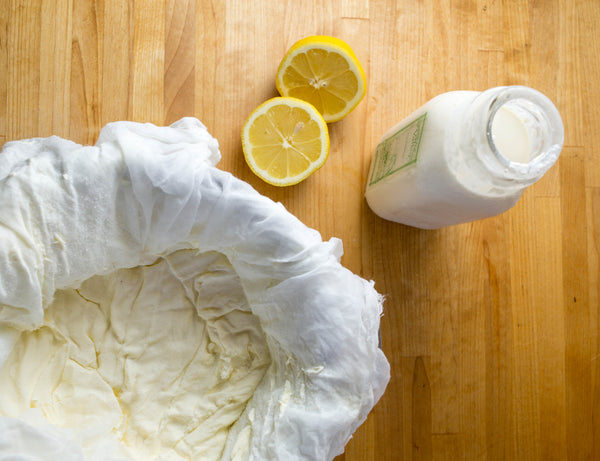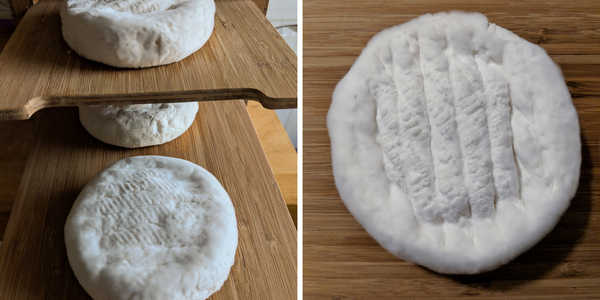Making cheese at home is easier than you think: All you need are some basic instructions, a few pieces of specialized equipment, the right ingredients, and your home kitchen to get started.
Here’s our home cheesemaking checklist to get you ready for our next virtual cheesemaking class! Don’t have specialized cheesemaking gear in your kitchen? No worries—each ticket comes with a Farmsteady Italian cheesemaking kit and all the recipes you need!

Home Cheesemaking Equipment
- Large, heavy-bottomed pot. This will be the miniature cheese vat where you’ll heat, culture, and coagulate your milk into curd.
- Slotted spoon or spider. Once those curds are cut, you’ll scoop them out of the pot with one of these.
- Large metal bowl. Great for catching whey from draining curds or filling with hot water to stretch mozzarella.
- Strainer. Perfect for lining with cheesecloth to drain your curds or even finished wheels.
- Long knife for cutting curds. A simple eight-inch chef’s knife works great for this, but there are special curd knives, too.
- Cheesecloth.* For draining curds in recipes like paneer. However, since cheesecloth is a single-use material, we typically recommend butter muslin, which can be washed, sanitized, and reused.
- Basket form.* For draining cheeses like whey ricotta or even aged cheeses into a wheel shape with a pretty woven pattern.
- Milk thermometer.* For checking milk temperature. The basic analog barista model works just fine, but if you keep an instant-read digital thermometer in your kitchen, that’s even better.
*Included in your Farmsteady Italian cheesemaking kit!

Home Cheesemaking Ingredients
- Acid.* Citric acid, lemon juice, or supermarket buttermilk (with active cultures) can all be used as an acidifying agent to make quick-set fresh cheeses like ricotta, mascarpone, paneer, and some of the quicker mozzarella recipes.
- Cultures. The microbes that make the magic happen. These are typically sold as freeze-dried powders, often in blends specifically formulated for certain cheese recipes. Starter cultures kick off fermentation and lower the milk’s pH, while secondary cultures add characteristics that show up in a finished cheese (think bloomy rinds and blue veins).
- Rennet.* These enzymes—which come from animal, vegetable, or microbial sources—coagulate liquid milk into a bouncy, gel-like curd. This enables us to separate the whey from the fat and protein in the milk, which will become cheese.
- Cheese salt.* Why use a separate salt for cheese? For cheesemaking, we want a salt that’s flaky, which helps it adhere to the surface of a wheel. We also want a non-iodized salt so that the cultures can flourish properly.
- Quality milk. The most important ingredient of all! You can’t make great cheese without great milk. Seek out the best-quality milk you can find—if you can access raw milk from a reputable producer in your area, it’s great to use even for recipes that involve pasteurization. Otherwise, fresh milk that says “pasteurized” on its label will work in most recipes (Tip: Check the expiration date on the milk—the fresher the better.) Be sure to avoid ultra high-temp pasteurized (UHT) milk. Its proteins won’t coagulate properly for cheesemaking.
- Heavy cream. For culturing into creme fraiche or cultured butter, or using to make luscious mascarpone! Again, avoid UHT cream when making cheese or other cultured dairy delights.
*Included in your Farmsteady Italian cheesemaking kit!

Home Cheese Aging Equipment
- Cheese Grotto. The best way to age cheese at home! The Cheese Grotto is designed to not only store cheeses so that they last longer and taste great—it’s also a home cheese cave. You can use it to age store-bought cheeses or do a little home affinage with your own wheels. And with four different sizes, you’ll be able to find the perfect fit for your kitchen.
- Hygrometer thermometer. For the next-level cheese aficionado or home cheesemaker. This handy device measures the humidity and temperature in your Grotto, helping you maintain the ideal aging environment.
What cheese are your dying to make at home? Let us know!

Leave a comment